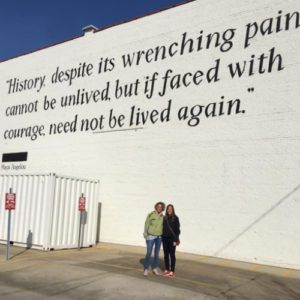
Photo provided by Allison Martin
When Carmel-Clay Middle School teachers, Liana Giles and Allison Martin, proposed taking a civil rights trip, school administrators didn’t hesitate to agree. And a grant from Hamilton County Community Foundation made the trip a reality.
Social studies teacher, Giles, and English teacher, Martin, set out on a civil rights tour in early 2019 to explore the possibility of a larger trip with students and parents during spring break 2020. The pair traveled to Nashville, Birmingham, Montgomery, Selma and Memphis visiting historic sites and museums and learning about the most influential moments in the nation’s civil rights movement—stories they realized aren’t a part of the curriculum they teach their students.
“It gives me goosebumps to think how much beyond Martin Luther King Jr. it goes and that our kids have no idea how much of the civil rights movement were kids,” said Giles. “They were the ones that took it into their own hands and were willing to meet with violent awful situations that they rose above, and that’s the thing I think is missing from our curriculum.”
Giles says she has conversations with her students often center around what’s missing from their textbook. “Our textbook has an entire chapter on Andrew Jackson, but we have nothing about Native Americans… Why is that? Do we do that in our society?” Her students respond to these questions with spirited debate and in-depth conversations. They are making connections about how the past is influencing current events.
“It gives me goosebumps to think how much beyond Martin Luther King Jr. it goes and that our kids have no idea how much of the civil rights movement were kids.”
The classroom, says Giles, is a safe place for students who are questioning things or dealing with difficulties in life. And a civil rights trip—standing in the plaza where slaves were sold, marching across the same bridge Congressman John Lewis marched from Selma to Montgomery—would lead to more in-depth and meaningful discussions. It would bring the history and its current impacts to life.
Middle schoolers are ready for real conversations about civil rights and equity, says Martin. “They so greatly understand the idea of injustice and something being fair and not fair. So for them to learn about all of these issues and topics in middle school, when they’re so keenly aware of injustice, is wonderful. It’s going to completely transform the kind of jobs they want to have and the difference they can make.”
Martin and Giles want to teach about civil rights earlier in a child’s education to build a foundational desire for equity that carries through middle school, high school, college and their careers as community and business leaders. There’s a ripple effect, and if the parents participate in the trip or conversations, there’s a multi-generational spread of knowledge that will yield powerful and transformative results.
While the trip taught Giles and Martin a lot about the history of the civil rights movement, Martin notes that inclusive education should be about more than a history lesson. As an English teacher, Martin and her colleagues are currently evaluating the novels and stories used in the classroom by assessing the diversity and ethnicity of both authors and characters. They are looking for books that better represent the diversity of the student body.
“If all the books that kids read are just windows into someone else’s life, that’s not healthy. They need to also have mirrors,” says Martin. “But for many of our students, they’re not part of majority culture. It’s hard to imagine yourself as the hero of a story when all you’re reading are stories of kids that don’t look like you.”
As a result of the trip, Giles and Martin say they returned feeling confirmed in their convictions and compelled to do more—in the classroom and as individuals.
“I’ve always wanted to empower my students, but this gives me, I feel like, a little bit of a platform of ‘how I go about empowering my students?’” said Giles. “’How do I bring this back to relevancy?’ This is pretty powerful so let’s talk about how it’s relevant.”
“It’s hard to imagine yourself as the hero of a story when all you’re reading are stories of kids that don’t look like you.”
Martin agrees. “I think the trip has challenged me, as a teacher in the school, to say, ‘okay, so I know these things, am I just going to let that stay in my head?’ It would be easy to maintain the system, or am I actually going to start pushing the next step to say ‘this isn’t enough’, we need to do better.”
Giles and Martin plan to weave more of their learnings into the classroom in the fall to establish an equity lens and framework for the entire 2019-2020 school year. Their goal is to invite a group of students and parents to join them for a civil rights trip during spring break in 2020.






The state of indiana recently passed legislation mandating that schools must offer ethnic studies courses to high school students. it seems that this curriculum could be helpful in making sure that Carmel-Clay schools are teaching inclusive civil rights information.